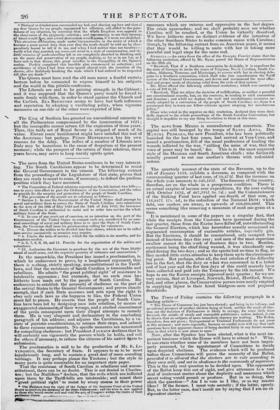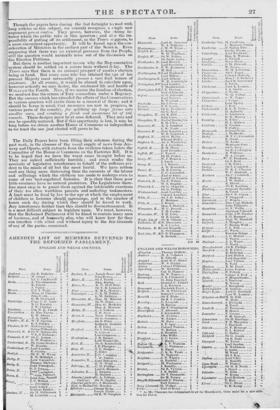The Times of Friday contains the following paragraph in a
leading article- " The House of Commons has just been elected; and being in its infancy, and no rational prospect of another election being at hand, neither the mode of elec- tion nor the duration of Parliaments is likely to occupy, for some little time forward, the minds of steady and reasonable politicians ; unless, indeed, it can be shown that no subjects of more immediate urgency are waiting. The Ballot, therefore, does not press ; Quinquennial or Triennial Parliaments do not press at this moment ; and more especially, because no candid man will say that such questions have less apparent Chance of being decided fairly in any future session, than in that which is now about to open.' Now, after the Speaker has been elected, what is the next im- portant business which the House will have to attend to ? Why, td ascertain whether some of its members have not been impro- perly returned, by the appointment of Committees to decide upon disputed elections. The evidence which will be produced before these Committees will prove the necessity of the Ballot, provided it is allowed that the electors are to vote according to their own will, and not in obedience to the commands of superiors. This is the only real question to be decided upon. The opponents of the Ballot keep this out of sight, and give utterance to a vast 'deal of irrelevant matter about the duplicity and meanness which secret voting would permit or produce. But in so doing, they shirk the question—" Am I to vote as I like, or as my master likes? If the former, I must vote secretly; if the latter, openly. But, in the latter case, don't insult me by saying that I am an in dependent elector." Though the papers have during the -last fortnight turned with long articles on this subject, we scarcely recognize a single new argument pro or contra. They prove, however, the trong in- terest which the public take in this question ; and also the im- possibility of -putting off its settlement, as the Times suggests; to a more convenient opportunity. It will be forced upcn the con- sideration of Ministers inthe earliest part of the Sessit n. Even supposing that there was no external pressure from the People, still the question would. naturally arise oust Of the discussion on the Election Petitions. • • • •
But; there is another important reason Why the Representative
• system should be settled on a secure basis without &lay. The Times says That there is no rational. prospect of anothcr election - being at hand. But every man who-has attained the age. of his , present Majesty must necessarily pessess a very frail tenure of • existence.. • At all events, it would _be absurd to calculate Upon, however ardently we may desire; the continued life and health of ...WILLiAlu the Fourth. Now, if we secure the freedom of election, we need not fear the return of Tory counsellors under a Regency. But the success which has attended the efforts of the Conservatives in various quarters will excite them to a. renewal of them'; 'and it should be borne in mind, that measures aro now in progress, in 71 various parts of the Country, for splitting up large farms into smaller ones, and creating a fresh and numerous lot of 501. vassals. These designs must be at once defeated. They mayand can be speedily matured.- But if this Opportunity is lost, it May be long before we obtain another House of Commons as independent as we trust the one just :elected will prove to be



















 Previous page
Previous page